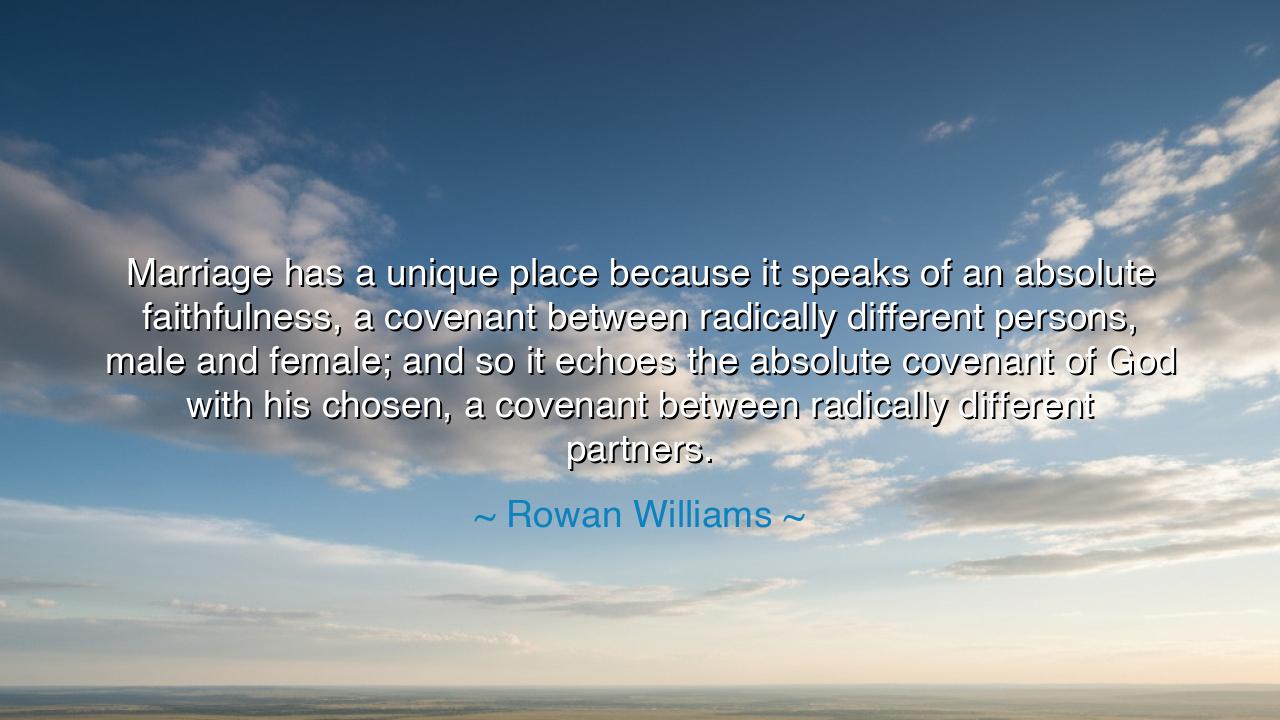
Marriage has a unique place because it speaks of an absolute
Marriage has a unique place because it speaks of an absolute faithfulness, a covenant between radically different persons, male and female; and so it echoes the absolute covenant of God with his chosen, a covenant between radically different partners.






In the profound and contemplative words of Rowan Williams, former Archbishop of Canterbury, we find a truth both sacred and eternal: “Marriage has a unique place because it speaks of an absolute faithfulness, a covenant between radically different persons, male and female; and so it echoes the absolute covenant of God with his chosen, a covenant between radically different partners.” These words are not the musings of mere theology—they are a meditation on the mystery of union itself, the joining of opposites into harmony. Williams sees marriage not as a human invention, but as a living parable of divine faithfulness, a reflection of heaven’s unbreakable promise mirrored in the fragile beauty of human love.
The origin of this quote lies in Williams’s lifelong contemplation of faith, love, and the human condition. As a theologian and spiritual leader, he sought to understand how the divine enters the ordinary, how eternity touches time through human relationships. To him, the covenant of marriage—the promise of faithfulness between two souls who are different in nature, temperament, and desire—reveals something of God’s own heart. For God, too, enters into covenant with humanity, though He is infinite and we are finite, perfect and yet we flawed. This is the mystery Williams unveils: that in every true marriage, the sacred and the mortal meet. Love becomes a sacrament, an earthly image of a heavenly truth.
Marriage, in his vision, is not merely companionship or contract—it is covenant, a sacred vow that endures beyond convenience or circumstance. To speak of “absolute faithfulness” is to invoke a bond that mirrors the eternal. Just as God’s love for His people does not falter when they stray, so too the vow of marriage calls each partner to steadfastness through trial and change. The radical difference between man and woman, far from being an obstacle, becomes the very means through which love grows, for in learning to cherish what is unlike oneself, one learns the humility that makes communion possible. Thus, marriage is not the merging of sameness, but the sanctifying of difference through love.
History gives us many examples of such covenantal love—marriages that endured not through ease, but through devotion. Consider the story of John and Abigail Adams, the hearts behind the early American republic. Separated by war and duty, their letters reveal a partnership founded on faith, intellect, and fidelity. In an age of upheaval, they remained steadfast to one another. Abigail once wrote, “Distance is nothing when one has a motive.” Their love, anchored in faith and sacrifice, reflected the absolute faithfulness of covenant Williams describes—a union that withstood separation, temptation, and time because it was rooted not in feeling alone, but in shared purpose and sacred trust.
Williams’s words also reveal a deeper insight into human nature: that love between radically different partners is not meant to erase difference, but to reconcile it. In this way, marriage becomes a mirror of divine redemption. For just as humanity is unworthy of God’s love yet receives it still, so too must spouses learn to forgive, to endure, and to see the divine in one another’s imperfections. The holiness of marriage lies not in perfection, but in perseverance—the daily choice to remain faithful when the heart grows weary and the world grows cold. In this constancy, love is refined into something eternal, something that echoes the covenant of God Himself.
But Williams’s wisdom extends beyond the realm of marriage—it is a teaching for all relationships, for every bond that seeks depth and holiness. The essence of his message is this: true love is covenantal, not conditional. It is not based on what one receives, but on what one gives; not on the ease of harmony, but on the strength of fidelity. Whether between husband and wife, parent and child, or friend and friend, love that endures difference and difficulty becomes divine in nature. For in choosing to stay, to forgive, to remain steadfast, the human heart participates in the very faithfulness of God.
So let this teaching be remembered by all who seek the truth of love: faithfulness is the highest form of freedom, and covenant is the path by which love becomes sacred. Let those who marry understand that they are not entering a mere union of bodies or emotions, but a living symbol of the eternal—a bond that demands patience, humility, and grace. When differences arise, let them not despair, but remember that it is through difference that love learns its depth.
And thus, in the timeless wisdom of Rowan Williams, we are reminded that marriage is not simply about two lives entwined, but about the divine mystery reflected through human hearts. It is a covenant of faithfulness, a promise to endure, to cherish, to forgive, and to mirror, however faintly, the love that never fails. For when two souls keep such a vow, they do not merely love each other—they participate in the love of God Himself, the eternal covenant that binds heaven and earth, spirit and flesh, forever as one.






AAdministratorAdministrator
Welcome, honored guests. Please leave a comment, we will respond soon